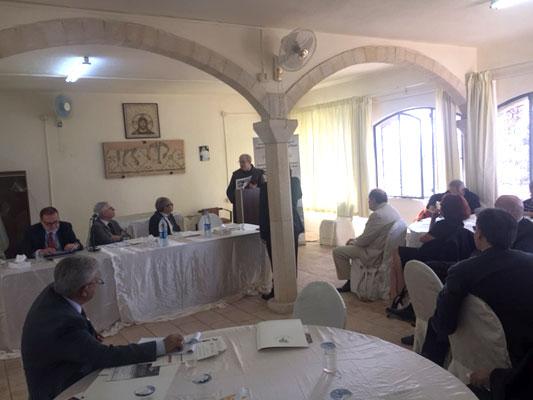You are here
Webinar tracks history of Prophet Moses Festival
By Saeb Rawashdeh - May 23,2022 - Last updated at May 23,2022

Pilgrims are passing by Gethsemane garden under the Mount of Olives in Jerusalem in 1936 (Photo courtesy of the Library of Congress)
AMMAN — The Prophet Moses Festival in Jersualem, established during the late Ottoman rule in 1850, brought together Ottoman officials, urban notables, young Arab nationalists, Sufis, bedouins and villagers, who “each attempted to structure the symbolic order of the ceremonies”, a recent webinar heard.
The Council for the British Research in the Levant recently held a webinar “Palestinian Rituals of Identity: The Prophet Moses Festival in Jerusalem, 1850-1948”.
Speaking during the webinar, Associate Professor of History Awad Halabi from Wright State University in Dayton said that Moses is the most mentioned figure in the Koran and they are multiple sites that claim to be the tomb of Moses, however, the Jericho shrine will become the famous after Sultan Baybaz found it in 1269.
“By ordering the symbolic ritual of the celebrations, each group attempted to promote a range of social and political messages of how they understood identity, modernity, Islam, politics, gender and colonialism,” Halabi said.
In 1863, the Ottomans established the first Jerusalem Municipal Council to oversee the Moses Festival and to transform it from the traditional celebration into an official ceremony based in Jerusalem, he said, noting that Palestinians have a memory of the festival as a great nationalistic celebration.
“The new rituals that the Jerusalem Municipal Council introduced were symbolic ways to express authority of urban notables in the Ottoman state,” Halabi said.
The festival was “no longer a religious affair but a civic concern”, which emphasised the political order of the late Ottoman Empire, he said.
“After British occupation of Palestine in 1917, the festival continued to change as new groups attempted to reorder symbols and rhetoric,” Halabi said, adding that British rulers knew that they are facing opposition and discontent from different social groups.
“The festival exposed a dilemma for marking the end of 400 years of Ottoman rule in Jerusalem. British participation helped to ease the contradiction between the independence Arabs sought and a reality of the British occupation,” Halabi said.
Related Articles
MADABA — Interreligious dialogue must be followed by action and inspire working together to shape a culture of peace and harmony
AMMAN — Structural and institutional crises, wars, insurgencies and territorial losses, as well as restructuring and reform, characterised t
Jordan, alongside other world countries, on Monday will mark the anniversary of Israa wal Miraj, Prophet Mohammad’s nocturnal journey from Mecca to Jerusalem and his ascension to heaven according to Islamic beliefs.


















